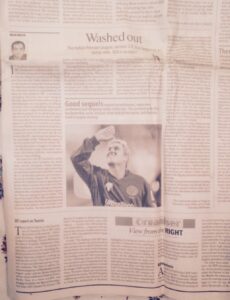It is official. Initial reports indicate that IPL 2 is not as hot as the first edition. The television rating meters have spoken and the first day ratings are down by nearly 30 per cent from last year. Now, television ratings are the fuzziest of categories, but in an industry which lives and dies by them, the tyranny of the television meters is unquestioned. As such, the first trends for IPL -2 are not encouraging. Of course, this could change in the days ahead but if viewers did not tune in when the hype was at its highest, it is difficult to believe how this will change substantially over the next 32 days.
In some ways, IPL-2 was always going to be an uphill battle from the moment the decision was taken to shift it to foreign climes. No matter how much propaganda Lalit Modi invested in, no matter how many Bollywood stars were prancing to his tune and no matter how many corporate leaders were listed on his roster, the life and blood of the IPL experiment has always been the great Indian public. Without the oxygen of the sub-continental fervour for cricket, IPL-2 would always have struggled. It undoubtedly still remains a huge newsmaker and a major advertising platform, but somehow last year’s zing is missing.
At a basic level, the IPL has been a victim of poor timing, poor location, too much hype, and yes, arrogance. South Africans love their cricket but their rugby season has already begun and much as the BCCI would like it, the weather gods are not dancing to the smell of Indian rupees. IPL-2 may have pulled off a logistical coup in organising the South African tourney but at the end of the day the viewers are not paying to watch the administrative machinations of the organisers. They are paying for good cricket. This was at the heart of the IPL’s grand success last year, but when rain becomes as important a factor as the players, then it is time to hit the panic button. As any good advertiser knows, nothing kills a bad product more than good advertising.
The tragedy is that no one wants the IPL to fail (except perhaps the ICL guys), least of all the average cricket fan. With corporate India grappling with the inexorable pull of the global recession, the IPL was a beacon of light. Especially at such a time, a little less arrogance and a little more common sense on both sides could have solved the eye-ball to eye-ball confrontation between the IPL and the Home Ministry. The IPL could not have been postponed, because of the clashes with the ICC calendar, but the option of a truncated version might just have been better than the forced South African sojourn.
At a deeper level, IPL-2 is facing the problem that all sequels have. IPL-1 had a great deal of novelty and curiosity value. The original benchmark it set was so high that the sequel always had a tall order. Remember Shahrukh Khan and KBC. It never quite reached the highs of the original version with Amitabh Bachchan, despite packing in a lot more variety and lots of new innovations. Sequels in the entertainment industry — and make no mistake, the IPL is a part of the entertainment industry — do succeed. But good sequels require inventiveness, some new excitement and intriguing twists in the tale. The problem with IPL-2 has been that, so far at least, it has had all the twists, but the tale itself is largely missing.
Part of the IPL’s great allure also lay in the adrenaline-thumping parade of sixes and fours that lit up Season 1 so brightly. The total entertainment package it offered allowed the non-cricketing public to buy in. Going to the IPL became a family affair, akin to a local mela in every city. This time, the matches are happening far away, with no on-ground activity. Equally, the conditions are dictating a better contest between the bat and the ball. This actually makes for more riveting cricket for the cricket fan. Paradoxically, is the slow pace a problem with the add-on fans who joined the bandwagon last year? If this is so, then it the will dictate the future of T20 itself.
The great irony, of course, is that it was the elections that forced the IPL’s physical exile from India and the elections may now be further eclipsing the IPL’s fortunes in the public’s mind as well. Of course, people are not unidimensional and the same people can very well watch cricket and simultaneously follow the travails of Messrs Advani and Manmohan Singh. It is undeniable though, that the IPL’s primary catchment area is the urban middle classes, which may not be great voters, but are certainly avid watchers of political trends. The IPL’s viewership base is the same as that of news channels — which is why they have bought so heavily into the event — and the elections are always a hefty counterweight while flipping channels, especially if it is raining.
Cricket, though has funny knack of making all analyses redundant and though Bruno, the dog, is the greatest story to come out of the IPL so far, who knows, we could all still be in for a surprise.
The writer is the author of ‘India on Television’ and a Fellow at La Trobe University, Melbourne.


